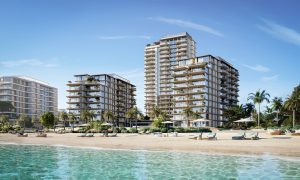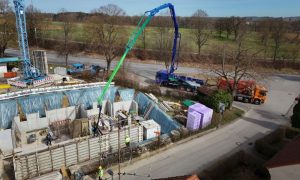Bringing cranes to Khalifa
Konecranes won a $120 million contract to supply 30 automated stacking cranes at the new deepwater gateway port that ADPC is constructing at Khalifa Port in 2011. Andreas Falk, Sales Director, Port Cranes & Lifttrucks, gives CMME an update.
CMME: What are Konecranes key benchmark projects in the region?
Andreas Falk: We have 30 ASC units at Khalifa Port including the TOS system, which is the single biggest order for Konecranes ever and conducted within a very challenging time schedule.
We also delivered 11 reachstackers and 19 electric chain hoist cranes to the Kuwait Port authority, during 2011, to help boost productivity at Kuwait’s ports.
CMME: Khalifa Port is such an important project for Abu Dhabi – you could say there’s a lot hanging on it in terms of serving industry within the emirate. Can you provide an update on the delivery and installation of the cranes at the port?
AF: The delivery, erection and commissioning of the automated stacking cranes (ASC) at Khalifa is proceeding at full speed. Currently 12 cranes out of 30 are erected, all of which has been achieved only one year after the contract signing. By June all cranes should be handed over to customer.
CMME: What would you say are the major challenges at Khalifa?
AF: The very tight time schedule with only 18 months from contract signing to handover of the 30 units, including the TOS system. This has been made possible thanks to our automation technology and experience in automated cranes from around the globe tied together with our long experiences in project management.
Another challenge is our responsibility to also deliver the terminal operating system (TOS), and to integrate that with other equipment and systems at the terminal.
CMME: Can you explain in more detail what cranes will be used at the port?
AF: We are delivering automated stacking cranes, which are unmanned rail mounted gantry cranes for stacking containers at the container yard. The ASCs are 10 container rows wide, and 1 over 5 containers stacking height. Cranes operation is fully automated with two cranes in each stack with the exception being picking or delivering containers to trucks where they are operated by remote control from a control room.
CMME: How are the cranes delivered to the Khalifa site?
AF: All critical components of the cranes are manufactured by Konecranes in Finland. Steel structures are manufactured from various factories we operate in Europe. The cranes come to the terminal in pieces and are erected on site.
CMME: How do the cranes actually work when in place?
AF: As I mentioned before, the cranes are rail-mounted and fully electric. Konecranes use a “state-of-the-art ‘anti sway’ active load control system which eliminates container sway and allows micro movement of spreader without trolley or gantry travel. This patented system allow the high precision required to obtain effective automated operation.
CMME: What other projects do you have in the pipeline?
AF: For automation cranes Konecranes has several projects in the order book and under discussion. In general there are several interesting port development projects in the Middle East region in the coming years. The expansion of Jebel Ali to mention one, the development of new Doha Port another, and the rail network expansions in UAE and Saudi Arabia.
CMME: What markets do you consider the most exciting right now?
AF: The UAE will continue to be very important with DP World Jebel Ali as one of the biggest ports in the world, and with the new KIZAD industrial development including Khalifa port in Abu Dhabi.
Saudi Arabia shows strong and consistent growth and will invest in infrastructure to develop the country for the young and growing population.
Iraq is another growth market – it will continue if political stability will remain.
CMME: Konecranes Middle East makes a good illustration of the region’s continuing development What are the company’s objectives for 2012?
AF: Konecranes Middle East will continue to develop our sales and dealer organisation and to continue to build our service department which is focused on offering service, support and modernisation schemes to crane customers in the region.
Konecranes has the biggest crane service operation in the world with close to 400,000 cranes under service contract, many being from other manufacturers. We also have state-of-the-art service products like railQ and ropeQ which Middle East customers can now also benefit from.
Further to supporting our customers in the region, Konecranes has recently signed the lease for a spare parts distribution centre in the UAE to cover the Middle East region. Furthermore Saudicranes, which manufacture cranes in Jubail, Saudi Arabia was acquired by Konecranes during the last year and the integration will continue.
Finally, and most importantly, we will focus throughout the year on serving our customer in the best possible way and to live up to our commitment that we are “smarter where it matters” and to never let customers down.

























